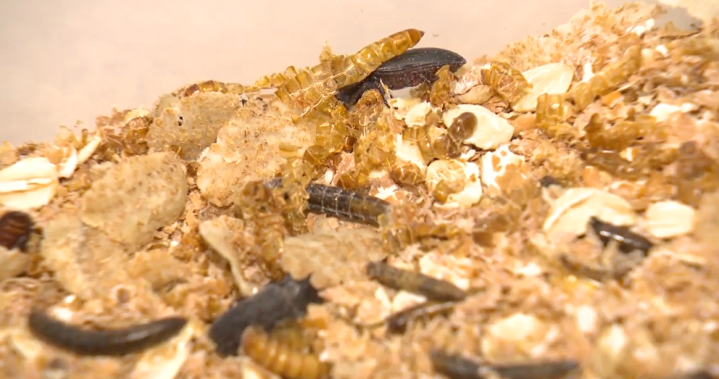If anything was bugging the judges at the University of British Columbia’s baking competition on Tuesday, it wasn’t the ingredients of the dishes.
According to the school’s executive chef, there were other issues with submissions to the Great UBC Bug Bake Off, but the insects — including ground mealworms and cricket powder — weren’t among them.
“It’s not easy to cook with insects, but also, they’re not professional chefs, so just cooking any good and presenting it to the judges is going to be challenging,” David Speight told Global News.
“There were some culinary misses that were regardless of the ingredients, but I thought they did a really great job. I like that they’re opening their minds and learning about insects as a protein source.”

The creepy crawly competition featured samosas, potato patties, pita, cookies, and more — all in an effort to raise awareness of the benefits and risks of eating insects. It’s part of an applied biology course taught by Yasmin Akhtar, an instructor in the Faculty of Land and Food Systems.
“This is a start,” she said after judging her students’ submissions. “Ten years ago when I talked about insects as food, my talk became very popular.
“Since then there have been many (insect) farms that have been established, many companies have been established, and I have seen that there’s an increase in the number of people that like to eat insects.”

Insects are a solution to many of the food sector’s sustainability woes, according to Akhtar. They require less space and fewer resources, and therefore have a smaller carbon footprint than livestock like pigs or cattle.
That’s in addition to their nutritional benefits — many are high in protein, calcium, good fatty acids and vitamins. One species of grasshopper eaten in Mexico, for example, has 48 grams of protein per 100 grams, compared to 27 grams per 100 grams of beef, she said.
But there’s still an “ick factor” about eating them, added Speight — one he’s not sure is deserving of insects alone.

“We like to show farms and produce growing because that’s pretty, but nobody wants to see the animal feed factories,” he explained. “Yet we still eat all that food without even thinking twice, so I think insects are no different.”
When she suggested serving up insects to her own friends, student and baker Evelyn Springer said many of them flatly rejected the idea. Now, she’s considering sneaking them into her baking and not telling a soul.
“It definitely is a controversial topic in North America,” Springer said, having entered mealworm-laden ginger cookies into Tuesday’s competition.
“I’ve never added insects in my baked goods before so I was very curious to see how they would turn out, and they actually turned out really well, which I’m surprised by. But it honestly showed how easy it is to incorporate a little bit of extra protein in everything.”

While the Great UBC Bug Bake Off primarily touted the benefits of eating bugs, Akhtar has said some risks come with the practice, too.
Some wild insects may be infested with bacteria, fungus and viruses, or contaminated with pesticides used on crops. Anyone with a seafood allergy may also be allergic to insects, given their shared similar protein allergens, she added.
Akhtar recommends treating insects by boiling or cooking them, or purchasing directly from an insect farm.
As it stands, up to 80 per cent of the world’s countries consume insects in one form or another, from maggot-filled cheese consumed in Italy’s Sardinia to the silkworm snacks often enjoyed in Thailand.
Sign up to receive newsletters and breaking news email alerts.

© 2023 Global News, a division of Corus Entertainment Inc.




